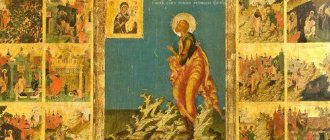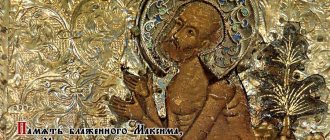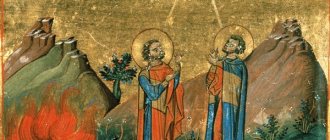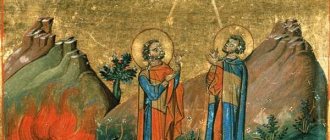Venerable Martyr Eugenia of Rome, virgin
The Venerable Martyr Eugenia, a Roman by birth, lived in Alexandria, where her father, Philip, was sent by Emperor Commodus (180–192) as governor of Egypt. Evgenia received an excellent education and was distinguished by her kind disposition and beauty. Many noble young men sought her hand, but she did not want to marry. Having become acquainted with the Epistles of the Apostle Paul, she rushed to Christianity with all her soul and, secretly from her parents, accompanied by her two slaves, Protus and Jacinthos, dressed in men's clothing, she retired to a monastery. There she, with her slaves and companions, received Holy Baptism from Bishop Eli, to whom it was revealed about her in a vision, and he blessed her to labor in the monastery in the guise of the monk Eugene.
Through her exploits, Saint Eugenia acquired the gift of healing. One day, a rich young widow, Melania, turned to her for help. Seeing the young monk, this woman was inflamed with unclean passion, but being rejected, she invented slander about attempted violence. Saint Eugenia appeared for trial before the ruler of Egypt, that is, before her father, and was forced to reveal her secret. Her family was delighted to find the one they had been mourning for a long time. After some time, they all accepted Holy Baptism. But Philip, following the denunciation of the pagans, was removed from his post as ruler. The Christians of Alexandria elected him as their bishop. The new ruler, fearing popular anger, did not openly execute Philip, but sent assassins. During the bishop's solitary prayer, he was inflicted with wounds, from which he died a martyr three days later. Having been widowed, Claudia, with her daughter and servants, left for her estate, located in the outskirts of Rome. There Evgenia continued her monastic life. She brought many virgins to Christ, and Claudia set up a hospice and served widows. After several quiet years, Emperor Gallienus (260–268) again began the persecution of Christians, and many of them took refuge with Saints Claudius and Eugenia. At that time, an orphaned young Roman woman from the royal family, Vasilla, having heard about Christians and about Saint Eugenia, wanted to meet the saint and wrote her a letter. In response, Saint Eugenia sent her friends and associates, Protus and Iakinthos, who enlightened Vasilla, and she received Holy Baptism. Basilla's maid told her fiancé Pompey that his bride had become a Christian, and Pompey complained to the emperor about Christians preaching celibacy. Brought to account, Vasilla refused to marry Pompey, and for this she was stabbed with a sword. Saints Protus and Jacinthos were dragged into the idol temple to make a sacrifice, but as soon as they entered there, the idol fell and broke. The holy martyrs Protus and Iakinthos were beheaded. Saint Eugenia was also forcibly brought to the temple of Diana, but before she had time to enter it, the entire temple, along with the idol, collapsed. The holy martyr was thrown into the Tiber with a stone around her neck, but the stone fell off and she remained unharmed. She remained unharmed in the fire. Then they threw her into a ditch, where she remained for 10 days. At this time, the Savior Himself appeared to her and announced that she would enter the Kingdom of Heaven on the day of the Nativity of Christ. When this bright holiday came in 262, the executioner killed the holy martyr with a sword. Soon Saint Claudia also accepted the crown of martyrdom. The Venerable Martyr Eugenia warned her about the day of her death.
See also:
- The Life and Suffering of the Holy Martyr Eugenia St. Dimitry Rostovsky
- Venerable Martyr Eugene Bishop. Alexander (Mileant)
EUGENIYA
According to the Life attributed to St. Simeon Metaphrastus, E. b. in the family of a noble Roman. Philip's nobles, who were under the emperor. Commode (180-192) was appointed governor of Egypt and moved to Alexandria with his wife Claudia, sons Avitus, Sergius and daughter. E. studied philosophy and spoke Latin. and Greek languages, was distinguished by her kind disposition and beauty. Mn. noble young men wooed her, but E. did not want to marry. After E. accidentally read the Epistles of St. Paul, she believed in Christ, but, fearing the wrath of her parents, she hid her faith. Under the pretext of a walk, she ran away from home and disguised herself as her husband. suit, came to the monastery along with her eunuch servants Protus and Iakinthos. Bishop who was in this monastery. Eliy, to whom it was revealed in a dream that E. was a maiden, baptized them and tonsured them as monks.
Martyrdom of the Primts. Evgenia and those who suffered with her. Miniature from Greco-cargo. manuscripts. XV century (RNB. OI58.L. 91 vol.) Martyrdom of the Primts. Evgenia and those who suffered with her. Miniature from Greco-cargo. manuscripts. XV century (RNB. OI58.L. 91 vol.)
E. led an ascetic lifestyle and through several. years, she was honored with the gift of miracles. After the death of the abbot, the brethren unanimously elected E. in his place. A certain woman named Melanthia, healed by E., was inflamed with passion for the young abbot and, not achieving reciprocity, slandered him before the ruler of Egypt in an attempt of violence. During the trial, which Philip carried out not only on E., but also on all the monks of the monastery, E. had to reveal that she was a girl. The ruler, recognizing his daughter, freed her along with her brethren and was baptized. Emperors Septimius Severus (193-211) and Antoninus Pius (138-161), in response to Philip's request, allowed Christians to build temples in cities. E. gathered virgins around her, and they served God together; her mother Claudia built a hospice house.
Having learned that Philip had converted to Christianity, the emperors appointed a new ruler in his place. Philip was elected bishop of Alexandria. Soon, by order of the new ruler, he was killed. Claudia moved to Rome with her children, her sons received high positions, and E. continued to instruct virgins in Christ. faith.
Under the emperors Valerian (253-260) and Gallienus (260-268), the persecution of Christians resumed. Vasilla, one of the virgins who believed in Christ and were baptized thanks to E., Protus and Jakinthos, was executed by order of the emperor. Gallienus for refusing to marry. 2 eunuchs were also beheaded. E. was captured and taken to the temple of Artemis (Diana) to make a sacrifice, but the temple collapsed even before she entered it. Then they tied a stone around E.’s neck and threw it into the Tiber, but the stone fell into the water, and the maiden walked on the water as if on dry land. E. emerged from the oven, which had suddenly cooled down, unharmed. After this, the martyr was thrown into a ditch and several. She was starved for days, but food was sent to her from heaven. The Savior appeared to E. and revealed the day of her martyrdom: she was executed on the feast of the Nativity of Christ. The saint was buried on the Latin road near Rome. After her death, E. appeared to her mother and predicted her imminent death.
The text of Martyrdom is replete with anachronisms. In Alexandria the events took place during the reign of Commodus, in Rome - under the emperors Valerian and Gallienus, i.e. almost a century later. Over time, in the legend about E. the names of Pope Soter (162 or 168-170 or 177) and Cornelius (251-253) appeared.
Eunuchs Prot, Iakinthos and MC. The Wasillas appear to be historical figures, but they have no connection with E., other than the proximity of their burials. Father E. is most likely a fictional character: ancient sources do not contain information about the Bishop of Alexandria or the martyr with the name Philip. Nevertheless, Adon and Uzuard (9th century) place Philip's memorial day under September 13. (as in the Roman Martyrology), perhaps due to the proximity to the day of memory of Protus and Jacinthos (Sept. 11).
The name of Claudia, E.'s mother, is mentioned only in the Roman itinerary Notitia portarum, where it is said that it is written on E.'s grave.
What date is Angel Eugene Day (woman)
Eugenia’s name day is celebrated 3 times a year: January 6, January 18, August 1. Saints named Eugene will be venerated 3 times in 2022. One of these dates is the Day of the Angel of a person named Eugene.
January 6 Eugenia of Rome, martyr, virgin: born in Rome. After her father was appointed ruler of Egypt, the family moved to Alexandria. Evgenia received a good education. Then, secretly from her parents, she went to a monastery. There she received holy Baptism. Eugenia of Rome suffered for her faith in Jesus Christ in 262, under Emperor Galien. First she was tortured, then beheaded with a sword.
Eugenia's name day is celebrated 3 times a year
January 18 Evgenia Domozhirova, New Martyr since 2000: born in 1871 in Riga in the family of a general. She was educated at the Institute of Noble Maidens in Warsaw and at the Red Cross School. In 1932 she was arrested. They accused him of anti-state activities and exiled him to Kazakhstan for 3 years. Evgenia Dozhirova died in 1933, in Alma-Ata prison. It is taken into account when searching for the heavenly patron of a person born no earlier than 2000.
August 1 Eugenia of Serbia, princess: birth name - Militsa was born around 1335. In 1353 she married the future Serbian prince Lazar Hrebeljanovic. After the death of her husband, she became the princess of Serbia. Upon reaching the age of majority, her son Stefan went to the Lyubostinia monastery she founded. In it she received the monastic name Evgenia. Before her death, she adopted a schema with the name Euphrosyne. She died in 1405.
The name Evgenia (female) in Orthodoxy
The name Evgeniya is the feminine form of the masculine Evgeniy. The word comes from the ancient Greek “eugenes”, which means “noble”. This was often the name given to children from the noble classes. In those days, a woman's name could most often be heard in the French version - Eugene.
The word Eugene is in the Orthodox calendar, so newborns can be baptized with this name. The patron saints of the name are the virgin and venerable martyr Eugenia of Rome; Princess Eugenia of Serbia Milica; Martyr Evgenia (Domozhirova).
All Zhenyas celebrate Eugenia's Day, name day or angel's day on January 6
According to the church calendar, Eugenia’s name day primarily occurs on the day before Christmas. And if we remember that in some interpretations the name Evgenia means “the one who will change the fate of the family,” then we can assume that all Eugenes are special. Perhaps even close to God. And their fate is special. They may be endowed with some kind of gift. Eugenia's Day, name day, or angel's day, all Zhenyas celebrate January 6th.
Eugene of Antioch
The memory of this Eugene is celebrated on February 19 . This Eugene was a presbyter in the temple and is considered one of the most revered saints in the Orthodox Church.
Confessors Eugene and Macarius served in the Antioch Church. At this time, Julian the Apostate was briefly on the throne in the country, who preached paganism and implanted the cult of the ancient gods everywhere. Eugene, together with Macarius, was offered to take part in pagan rituals, but the future saints refused to do this, for which they were subjected to cruel torture.
Instead of the death penalty, Eugene and Macarius were sentenced to a slow and painful death in the desert. Local residents knew that a huge snake lived in those parts, destroying everything in its path. However, the saints were not afraid to get there and lightning destroyed the snake. When the danger had passed, the saints settled in the desert and prayed desperately. They died on the same day.
The memory of Eugene of Antioch is celebrated in some calendars on March 4 or March 3 in the high year. Another day of celebration is February 19th.
Venerable Eugene of Vithynia
His memorial day is February 25. At this time, all men named Eugene celebrate their angel day. But this man's life was known for a completely different fact.
Evgeniy had a daughter, Maria, who decided to become a nun, but there was no female monasticism at that time, so she introduced herself as a guy and went to the monastery under the name Marin.
Moreover, she had to go through a difficult test for a monk - the girl fell in love with a pseudo-boy and began to demand intimate relationships from him, thinking that he was a guy. Naturally, she received nothing and decided to take revenge on her lover by becoming pregnant by another and slandering the monk.
Marin endured this calmly and even agreed to leave the monastery for the desert because he was kicked out. After all, the girl brought a child allegedly from him and said that Marin’s brother was guilty of this. After some time, Marin was again accepted into the monastery, although reluctantly, and only after his death did the monks learn that it was a woman.
This is how female monasticism appeared, and the church later also presented Father Eugene as a saint. His daughter raised her pseudo-son, who later became a monk, and his mother was healed of madness.








